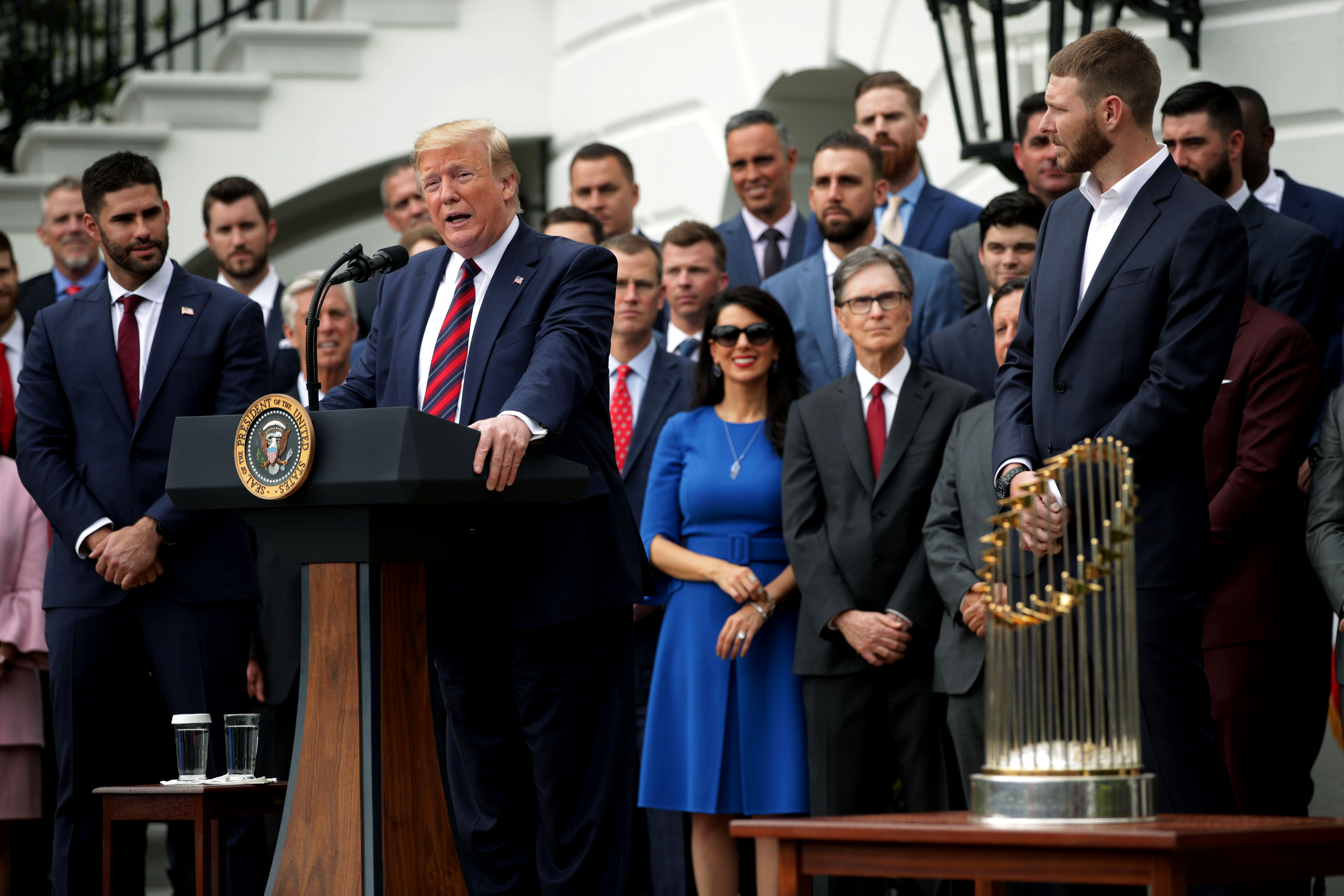Sports as a mirror
In the Trump Era, even championship teams are divided by race


A free daily email with the biggest news stories of the day – and the best features from TheWeek.com
You are now subscribed
Your newsletter sign-up was successful
This is the editor’s letter in the current issue of The Week magazine.
When the Boston Red Sox went to the White House last week to be honored by President Trump for their 2018 World Series victory, about 10 of the 25 players boycotted. All were Hispanic or African-American. "It's personal, bro," catcher Christian Vazquez explained to The Washington Post. Like Red Sox manager Alex Cora, who also didn't go, Vazquez is from Puerto Rico and doesn't appreciate how Trump has treated the U.S. island devastated by Hurricane Maria. In the Trump era, these boycotts have become the norm. The University of Virginia men's basketball team recently refused a White House invitation. Trump angrily disinvited the Golden State Warriors in 2017 and the Philadelphia Eagles in 2018 after black players said they would not show up. They did not want to shake the hand of the president who demanded that the NFL fire the mostly black "sons of bitches" who knelt in protest during the national anthem.
Sports, in its finest moments, can enable Americans to forget and even transcend race. But our games have always been a mirror of society, showing us where race relations stand — and what we see today is not pretty. The Trump presidency has been like a magnitude-8.0 earthquake that has widened fault lines of race, class, and culture into chasms. Across these rifts, Americans view each other with growing disdain and mutual incomprehension. How can you show such disrespect to our president? shouts the tribe on one side. How can you not see how deliberately divisive your president is? responds the other. You have to wonder how much uglier this will get, and how it ends. At a rally in Florida last week, the president pointedly noted that border security agents can't use weapons on the migrants asking for asylum at the border. "How do we stop these people?" Trump asked. "Shoot them!" one rallygoer shouted. The crowd erupted in cheers and laughter, and the president of the United States grinned.
The Week
Escape your echo chamber. Get the facts behind the news, plus analysis from multiple perspectives.

Sign up for The Week's Free Newsletters
From our morning news briefing to a weekly Good News Newsletter, get the best of The Week delivered directly to your inbox.
From our morning news briefing to a weekly Good News Newsletter, get the best of The Week delivered directly to your inbox.
A free daily email with the biggest news stories of the day – and the best features from TheWeek.com
William Falk is editor-in-chief of The Week, and has held that role since the magazine's first issue in 2001. He has previously been a reporter, columnist, and editor at the Gannett Westchester Newspapers and at Newsday, where he was part of two reporting teams that won Pulitzer Prizes.
-
 Is Andrew’s arrest the end for the monarchy?
Is Andrew’s arrest the end for the monarchy?Today's Big Question The King has distanced the Royal Family from his disgraced brother but a ‘fit of revolutionary disgust’ could still wipe them out
-
 Quiz of The Week: 14 – 20 February
Quiz of The Week: 14 – 20 FebruaryQuiz Have you been paying attention to The Week’s news?
-
 The Week Unwrapped: Do the Freemasons have too much sway in the police force?
The Week Unwrapped: Do the Freemasons have too much sway in the police force?Podcast Plus, what does the growing popularity of prediction markets mean for the future? And why are UK film and TV workers struggling?
-
 Epstein files topple law CEO, roil UK government
Epstein files topple law CEO, roil UK governmentSpeed Read Peter Mandelson, Britain’s former ambassador to the US, is caught up in the scandal
-
 Iran and US prepare to meet after skirmishes
Iran and US prepare to meet after skirmishesSpeed Read The incident comes amid heightened tensions in the Middle East
-
 Israel retrieves final hostage’s body from Gaza
Israel retrieves final hostage’s body from GazaSpeed Read The 24-year-old police officer was killed during the initial Hamas attack
-
 China’s Xi targets top general in growing purge
China’s Xi targets top general in growing purgeSpeed Read Zhang Youxia is being investigated over ‘grave violations’ of the law
-
 Panama and Canada are negotiating over a crucial copper mine
Panama and Canada are negotiating over a crucial copper mineIn the Spotlight Panama is set to make a final decision on the mine this summer
-
 Why Greenland’s natural resources are nearly impossible to mine
Why Greenland’s natural resources are nearly impossible to mineThe Explainer The country’s natural landscape makes the task extremely difficult
-
 Iran cuts internet as protests escalate
Iran cuts internet as protests escalateSpeed Reada Government buildings across the country have been set on fire
-
 US nabs ‘shadow’ tanker claimed by Russia
US nabs ‘shadow’ tanker claimed by RussiaSpeed Read The ship was one of two vessels seized by the US military
